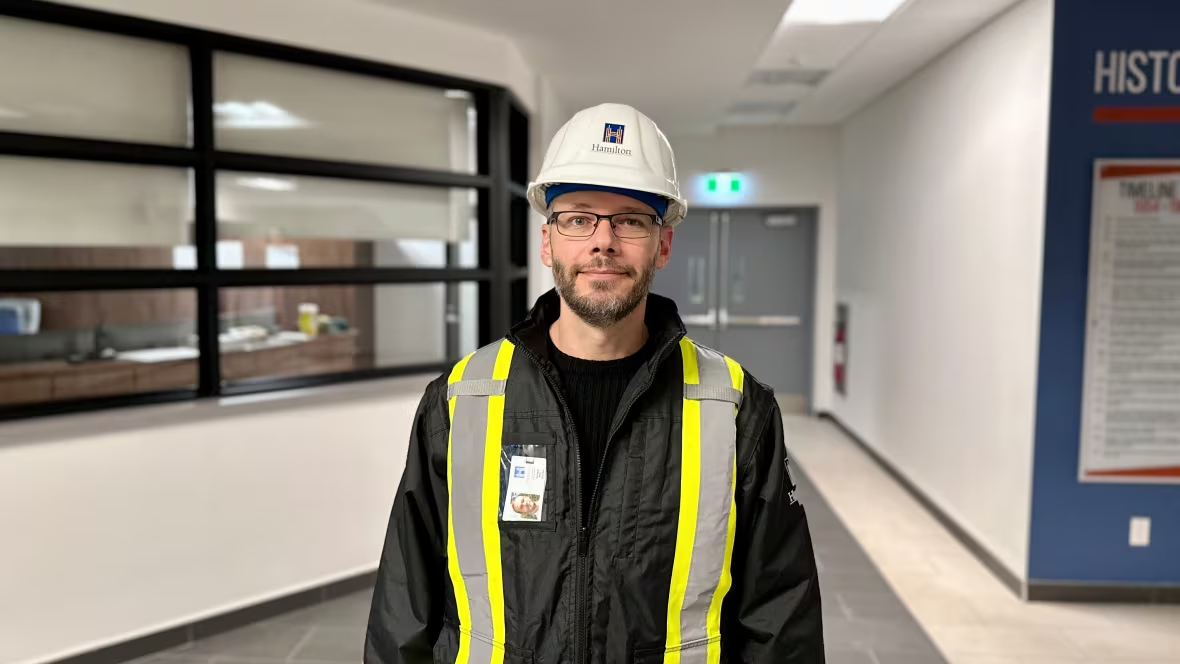Hamilton wins awards for water projects — 'good things' are happening after mistakes: city water boss
The City of Hamilton won two Water Canada awards for wastewater and stormwater projects

Hamilton won two awards for projects monitoring stormwater and wastewater.
Nick Winters, the city's head of water, describes the awards — issued by trade publication Water Canada in August — as "recognition among our industry peers that there are good things happening in Hamilton."
The city experienced high-profile water mishaps in recent years, such as the 2022 and 2023 discoveries of quarter-century-old leaks funnelling billions of litres of sewage directly into Lake Ontario. It's also invested about $340 million in water treatment upgrades, and is looking toward a further $1 billion in improvements.
"There's a group within Hamilton Water, and other city programs as well, that are fiercely committed to doing what's best for our community," Winters told CBC Hamilton. "That means doing the right thing and doing it at the lowest possible cost."
Drone-mounted sonar provides more accurate measurements
The first project Water Canada recognized is a city partnership with Mohawk College in which drone-mounted sonar scans help determine when Hamilton's stormwater ponds need to be drained.
The ponds, which capture and store runoff, collect sediment and need to be dredged every 10-20 years, Winters said. Standard practice has been to send someone out in a boat with a yardstick to measure a pond's depth. Then, workers use a formula to estimate the overall depth and decide if a pond needed to be dredged.
The problem with that, Winters said, is it's costly, time-consuming and often inadequate to really calculate a large pond's depth. In a typical year, the city might plan to dredge three ponds, only to "burn our entire budget" on the first two due to an underestimation.
By flying over the ponds and using sonar, Winters said the city can take accurate measurements and make realistic plans.
He said the partnership came about due to a "chance encounter" between a city worker and someone from Mohawk College.
City working with researchers at local college
"Adapting this technology to unmanned systems allows industry partners to take sonar instrumentation into places where it is neither safe nor feasible to take a manned boat," Cristina Gage, Mohawk College's dean of applied research, said in an email.
She added that working with partners such as the city helps researchers investigate new technologies. The college has used the unmanned sonar tech on the 407 ETR and might use it with local conservation authorities too, she said.
Corinne Lynds, a spokesperson for Water Canada, said judging for the stormwater and wastewater categories was based on a project's "usefulness, innovation, environmental or social benefits, and its scalability."
She said the judges found the drone solution had potential to be copied elsewhere.
Robert Haller, the director of the Canadian Water and Wastewater Association, describes what Hamilton and the college are doing as "cutting edge," and noted he's seen a rise in drone-mounted tech at trade shows.
He said this, and Hamilton's other winning project, are "about doing the work that needs to be done but not until it needs to be done."
The second project is the city's ongoing effort to identify cross-connections in its sewage system — spots in which combined or sanitary sewer pipes may be incorrectly connected to storm sewer pipes.
Such mistakes were to blame for the long-term leak discovered in 2022 and prompted the city to start proactively inspecting more locations.
WATCH | From 2022: City of Hamilton discovers 26-year leak of sewage into Hamilton Harbour
Looking for leaks
As of March 2023, staff had found three spills, the city website says. Winters said his team will share an update with city council in November.
"We haven't found any cross-connected sewers in 2024, which is a good thing," he said.
He said the February cyberattack on the city disrupted work because workers lost access to digital records, and there was a period of several months in which they couldn't hire anyone new.
City workers often hear residents' concerns about sewage spills firsthand, Winters said.
For him, the award is "a recognition of Hamilton owning the problem" and a "willingness to be transparent," as the city manages its aging wastewater infrastructure.

Lynds said judges were most impressed by the project's environmental benefits and the potential for it to be implemented by other municipalities.
Before the project started, Winters said, there was talk about whether Hamilton should proactively inspect "all 2,200 kilometres" of the city's wastewater system. That wouldn't have been efficient or cost-effective, he said, adding that he believes the current program is.
It's likely Hamilton will continue to find issues as it searches, Haller said, adding the city has one of the oldest wastewater systems in Canada.
"There aren't great records from the past," he said. "A lot of time, the history and knowledge of these systems went with the manager who put them in."
"We're retroactively trying to repair ancient systems," Haller added. "But [Hamilton seems] to be tackling it very aggressively."


